Learn
Place-Based Education
The Centre for Sustainable Food Systems offers place-based and experiential learning opportunities to a diverse community of people.
We are helping to cultivate a new generation of solution-makers who apply systems approaches based on agroecological principles to address the overlapping challenges facing our food system. Our work engages with UBC students and faculty, teachers, children, youth community programs, current and future farmers, and Indigenous partners. We offer programs, classes and resources from student work placements, children and youth education to the UBC Farm Practicum in Sustainable Agriculture.
Our Goal
To develop the next generation of food system leaders and be an inclusive space for sustainable food systems teaching and learning, for UBC students and beyond.
Find out more about our Strategic Plan for Place-Based Education.
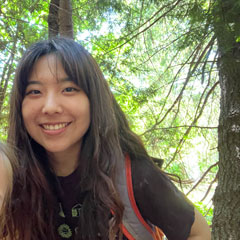
Rei Clarissa, Children’s Program Assistant
"As someone who didn’t grow up surrounded by nature, I think this summer really hammered it home to me what it is that is at stake with global warming. It also made me realize how important our connection with nature is, and to never lose it."
36083
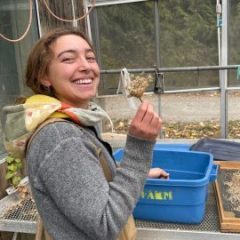
Emi Durfeld, Perennials and Seed Crop Worker
"I have been lucky to have had a flavorful taste of different tasks throughout the seasons. In the fall, I spent time harvesting perennial herbs for Saturday markets, helping out with farm harvests and harvesting seed from crops. In late fall and early winter, I transitioned more of my work to processing harvested seed, which consisted of threshing, winnowing and sieving to clean the seed thoroughly."
34608
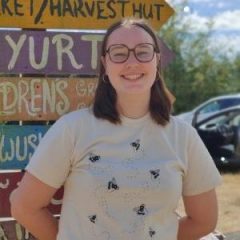
Kate Dunne, Saturday Farmers' Market Worker
"Saturday Market Workers serve as the link between the public, vendors, and farm staff. We work closely with all three, making connections and learning about the struggles each group faces. This allows the UBC farm to operate as a strong community, supporting new vendors by sharing knowledge, and improving sustainable small scale food systems for everyone."
34604
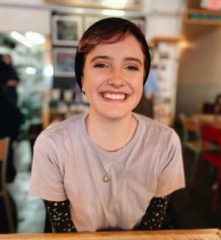
Natalie Hamilton, Farm Ambassador
"I learned how much I enjoy being able to engage with and talk to various people at outreach events and how wonderful the UBC farm community is. I also learned a lot from the awesome staff and students I was able to work with. Additionally, I valued being able to further my graphic design skills and to understand the process of designing materials for a large organization."
32661
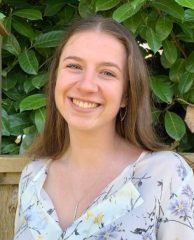
Bowen Wright, Saturday Market Worker
"Going to Friday Harvests was one of the highlights of my summer; I loved spending time working in the fields chatting, laughing, and getting to know the Practicum students and Field staff. While the physical work itself can be hard, it is also rewarding and fun!"
32658

Mackenzie Dorsey, UBC Farm Ambassador
"The Farm is a great asset to UBC, and it is important that students, professors, and the community know about this “hidden gem” at the bottom of campus!"
31114
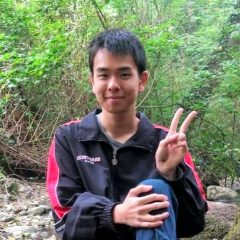
Timothy Wong, Market Sales Worker
"I think most people don’t quite understand the sheer size of the UBC Farm. It’s often advertised as being 24 hectares, but you really can’t grasp the sheer scale of it until you visit in person. I also think that people underestimate the number and type of projects that are on the farm. It extends far beyond just growing produce, and there are numerous research projects and unique undertakings. For instance, did you know that there’s a project that’s aiming to grow truffles?"
31041
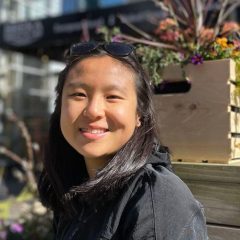
Camille Lyu, Saturday Farm Market Worker
"One important aspect and mission of the UBC Farm is connecting land, food, and community. The Saturday Farm Market is an essential piece of building that connection. The market offers an opportunity for community members to connect to the land that grows the food."
31036
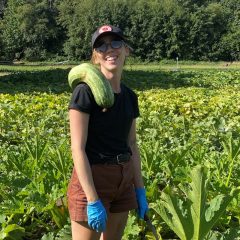
Ashley Bell, Vegetable Field Worker
"Everyone has each other’s best interest at heart and make sure to help each other out whenever possible."
31029

Ally Cheng, UBC Farm Ambassador
"Before this position, I had little knowledge about UBC Farm and sustainability work in UBC. it is great to dig into all the amazing work that UBC Farm is doing and all the sustainability efforts that have been made!"
29732

Mairead Norton, BC Food Web Science Communication Assistant
"The research that the CSFS is producing has the ability to change the way we do agriculture, to restructure our food systems, and to make significant strides towards a more sustainable future."
29613
36083
34608
34604
32661
32658
31114
31041
31036
31029
29732
29613
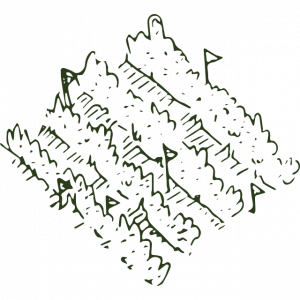
Students
How students can get involved
The Centre for Sustainable Food Systems provides many for-credit and not-for-credit opportunities for students to get their hands dirty and learn about the food system. Get information below on internships, courses, volunteering, student groups, and more.

Not For Credit
Get involved with the Centre for Sustainable Food Systems at UBC Farm.
Much of the great work that happens at the UBC Farm is made possible by the continued support of the Farm’s dedicated volunteers. The UBC Farm volunteer program provides UBC students, staff, faculty members, and members of the wider community the chance to gain hands-on experience in many aspects of small-scale sustainable farming.
/get-involved/volunteer-program/">Learn more
The Centre for Sustainable Food Systems at UBC Farm offers paid Student Work Learn, for-credit Career Development, and Volunteering positions.
Find available opportunities

For Credit
Courses and academic credit for UBC students, and certificate programs for non-UBC students.
Programs
Interested in a degree in Applied Biology, Global Resource Systems, or Food, Nutrition and Health? Explore Land and Food Systems’ Undergraduate programs.
Land and Food Systems Courses
- AGEC - Agricultural Economics**
- ANSC - Animal Science**
- APBI - Applied Biology
- FNH - Food, Nutrition and Health
- FOOD - Food Science**
- FRE - Food and Resource Economics
- GRS - Global Resource Systems
- HUNU - Human Nutrition**
- LFS - Land and Food Systems
- LWS - Land and Water Systems**
- PLNT - Plant Science**
- SOIL - Soil Science**
Forestry at the UBC Farm
About half of the UBC Farm is second-growth forest and it is a rich area for learning and research. The Faculty of Forestry is a partner with the Centre for Sustainable Food Systems at UBC Farm, and offer students and instructors opportunities to learn about cultivating forest stewardship.
Learn more
Gain credit and career experience
LFS 496 Career Development placements prepare UBC students professionally and academically for future careers through a mentored learning experience with a real food business or organization. Students apply the theory they gain from class through on-the-ground, food system-related work and course assignments that support their practical learning.
Learn more
The UBC Farm Practicum in Sustainable Agriculture is a six (or four)-month experiential learning program designed for aspiring farmers, urban gardeners, environmental educators, and students with an interest in applying their learning about sustainable agriculture and food systems.
Learn more
Develop your understanding of the connections between food, health, society and the environment, and gain tools to solve complex food systems problems locally and globally, with the UBC Minor in Sustainable Food Systems.
Students completing the minor are immersed in experiential and interdisciplinary learning opportunities, involving several departments and faculties across UBC, as well as off- campus partners.
Learn more
If you want your education to have a big impact, learn with us at the CSFS at UBC Farm – and a great way to get involved is through the Faculty of Land and Food Systems (LFS) at UBC. In an LFS degree, you’ll work with professors, professional practitioners, community leaders and peers to drive change in the areas of food security and safety, human nutrition, and the way we lean on our land. LFS programs even let you get your hands dirty to study and learn right here at the UBC Farm!
p>
Learn more

Instructors
Instructors and Faculty
Bring your class to the UBC Farm
Planning to bring your class to the UBC Farm? Looking to book a tour? Fill out our Booking Form for Academic Visits and Guided Tours! We need to know when classes are on site for safety reasons, and it helps us plan our educational programming appropriately to make sure your class has the best experience possible.
Academic Space Bookings
The CSFS provides indoor and outdoor spaces such as agricultural fields, conservation forests, and classrooms for teaching activities at the UBC Farm and MacMillan 170A.
For information on research and teaching space booking fees and policies, please see Academic Space Use Guidelines. To book space contact our Site Coordinator.
Food Systems Learning Resources
Just Food Educational Resource: Food Justice Learning Modules
The Just Food resource was born from a group of students’ desire to incorporate an equity lens into their learning, and to address the injustice they saw in their daily lives. It consists of learning modules on food systems and a facilitator’s guide. A diverse range of topics are covered, including agriculture, food studies, nutrition, and more.
Find the Learning Modules here.
Food Systems Case Studies
The Centre for Sustainable Food Systems created open educational resources that can be adapted to any discipline, by anyone at UBC or elsewhere. These case studies provide an experiential and place-based learning opportunity by exploring and understanding a food system asset at UBC.
Find Food Systems Case Studies here.
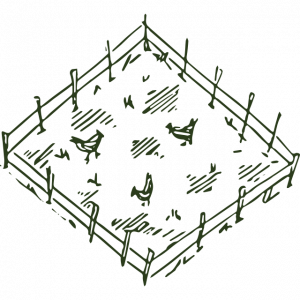
Children's Programs
What are the kids learning at the UBC Farm?
Day camps and school field trips bring thousands of K-12 students to the UBC Farm each year. From gardening their plots in the children’s garden, to identifying bugs along the agroforestry trail, there is a bounty of hand-on activities for kids in our child and youth programs. Field games, seeding in the greenhouse, baking with farm produce, fort-building, composting, apple picking, chicken feeding, berry picking, potato hunting and medicine making just to name a few.
Learn more

Indigenous Gardens
Indigenous Initiatives at the UBC Farm
The Centre for Sustainable Food Systems (CSFS) at UBC Farm is located on the unceded ancestral territory of the hən̓q̓əmin̓əm̓-speaking xʷməθkʷəy̓əm (Musqueam) people, whose guidance and collaboration is vital to all activities on the Farm. Several gardens run educational programming autonomously at the UBC Farm.